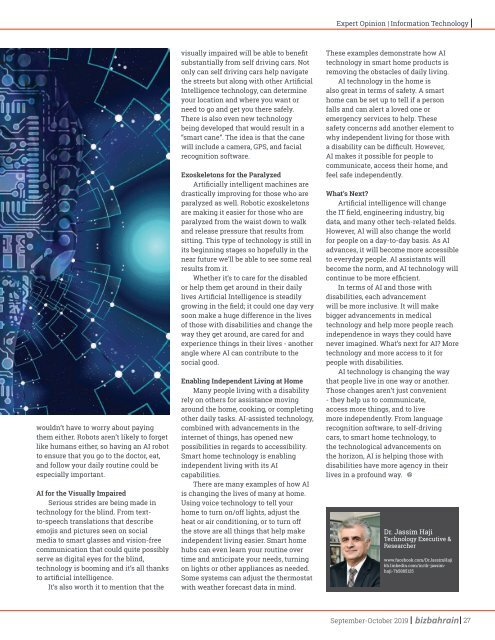BizBahrain Magazine Sep-Oct 2019_compressed
Create successful ePaper yourself
Turn your PDF publications into a flip-book with our unique Google optimized e-Paper software.
Expert Opinion | Information Technology<br />
wouldn’t have to worry about paying<br />
them either. Robots aren’t likely to forget<br />
like humans either, so having an AI robot<br />
to ensure that you go to the doctor, eat,<br />
and follow your daily routine could be<br />
especially important.<br />
AI for the Visually Impaired<br />
Serious strides are being made in<br />
technology for the blind. From textto-speech<br />
translations that describe<br />
emojis and pictures seen on social<br />
media to smart glasses and vision-free<br />
communication that could quite possibly<br />
serve as digital eyes for the blind,<br />
technology is booming and it’s all thanks<br />
to artificial intelligence.<br />
It’s also worth it to mention that the<br />
visually impaired will be able to benefit<br />
substantially from self driving cars. Not<br />
only can self driving cars help navigate<br />
the streets but along with other Artificial<br />
Intelligence technology, can determine<br />
your location and where you want or<br />
need to go and get you there safely.<br />
There is also even new technology<br />
being developed that would result in a<br />
“smart cane”. The idea is that the cane<br />
will include a camera, GPS, and facial<br />
recognition software.<br />
Exoskeletons for the Paralyzed<br />
Artificially intelligent machines are<br />
drastically improving for those who are<br />
paralyzed as well. Robotic exoskeletons<br />
are making it easier for those who are<br />
paralyzed from the waist down to walk<br />
and release pressure that results from<br />
sitting. This type of technology is still in<br />
its beginning stages so hopefully in the<br />
near future we’ll be able to see some real<br />
results from it.<br />
Whether it’s to care for the disabled<br />
or help them get around in their daily<br />
lives Artificial Intelligence is steadily<br />
growing in the field; it could one day very<br />
soon make a huge difference in the lives<br />
of those with disabilities and change the<br />
way they get around, are cared for and<br />
experience things in their lives - another<br />
angle where AI can contribute to the<br />
social good.<br />
Enabling Independent Living at Home<br />
Many people living with a disability<br />
rely on others for assistance moving<br />
around the home, cooking, or completing<br />
other daily tasks. AI-assisted technology,<br />
combined with advancements in the<br />
internet of things, has opened new<br />
possibilities in regards to accessibility.<br />
Smart home technology is enabling<br />
independent living with its AI<br />
capabilities.<br />
There are many examples of how AI<br />
is changing the lives of many at home.<br />
Using voice technology to tell your<br />
home to turn on/off lights, adjust the<br />
heat or air conditioning, or to turn off<br />
the stove are all things that help make<br />
independent living easier. Smart home<br />
hubs can even learn your routine over<br />
time and anticipate your needs, turning<br />
on lights or other appliances as needed.<br />
Some systems can adjust the thermostat<br />
with weather forecast data in mind.<br />
These examples demonstrate how AI<br />
technology in smart home products is<br />
removing the obstacles of daily living.<br />
AI technology in the home is<br />
also great in terms of safety. A smart<br />
home can be set up to tell if a person<br />
falls and can alert a loved one or<br />
emergency services to help. These<br />
safety concerns add another element to<br />
why independent living for those with<br />
a disability can be difficult. However,<br />
AI makes it possible for people to<br />
communicate, access their home, and<br />
feel safe independently.<br />
What’s Next?<br />
Artificial intelligence will change<br />
the IT field, engineering industry, big<br />
data, and many other tech-related fields.<br />
However, AI will also change the world<br />
for people on a day-to-day basis. As AI<br />
advances, it will become more accessible<br />
to everyday people. AI assistants will<br />
become the norm, and AI technology will<br />
continue to be more efficient.<br />
In terms of AI and those with<br />
disabilities, each advancement<br />
will be more inclusive. It will make<br />
bigger advancements in medical<br />
technology and help more people reach<br />
independence in ways they could have<br />
never imagined. What’s next for AI? More<br />
technology and more access to it for<br />
people with disabilities.<br />
AI technology is changing the way<br />
that people live in one way or another.<br />
Those changes aren’t just convenient<br />
- they help us to communicate,<br />
access more things, and to live<br />
more independently. From language<br />
recognition software, to self-driving<br />
cars, to smart home technology, to<br />
the technological advancements on<br />
the horizon, AI is helping those with<br />
disabilities have more agency in their<br />
lives in a profound way.<br />
Dr. Jassim Haji<br />
Technology Executive &<br />
Researcher<br />
www.facebook.com/DrJassimHaji<br />
bh.linkedin.com/in/dr-jassimhaji-7b5885125<br />
<strong>Sep</strong>tember-<strong>Oct</strong>ober <strong>2019</strong><br />
27
















